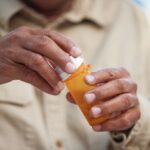Sadly, there is a close connection between domestic violence and addiction. Studies by the American Society of Addiction Medicine and the United States Department of Justice indicate forty to sixty percent of all reported incidents of domestic violence occurred while the abuser was under the influence of drugs or alcohol, with the majority of them having a substance use disorder. The studies also reported that children who grew up in a family where domestic violence occurred have a higher chance of abusing drugs or alcohol as adolescents or adults.
It is important to remember that most people with substance use disorders do not engage in domestic violence. But many people who engage in domestic violence also abuse or are addicted to drugs or alcohol.
What is Domestic Violence?
The National Domestic Abuse Hotline defines domestic violence as “a pattern of behaviors used by one partner to maintain power and control over another partner in an intimate relationship.” Domestic violence is also known as intimate partner violence (IPV), relationship abuse, and domestic abuse. According to the National Conference of State Legislatures, as of 2019, all 50 states have expanded their definition of victim to include spouses, children, family members, cohabitants, and intimate dating and sexual partners. In approximately 38 states, including Tennessee, domestic violence is a criminal offense.
In every abusive relationship, there is an imbalance of control and power. The abuser controls their victim using behaviors and words that are hurtful and intimidating. Many incidents of domestic violence include behaviors that cause physical harm and generate fear: physical violence, sexual violence, emotional abuse, threats, humiliation, and economic deprivation. Domestic violence may also involve emotional, verbal, or physical intimidation, physical attacks, rape, maiming or killing pets, or destruction of property.
The four main types of domestic violence include:
- Physical violence
- Sexual violence
- Psychological aggression
- Stalking
Some types of domestic abuse involve drugs or alcohol in a different way. Examples of these types of abuse include:
- Forcing partners to buy, sell, or carry drugs
- Giving partners a drug to deliberately cause them to become addicted and then using that drug as a way to control the person
- Stopping partners from getting treatment for substance abuse
- Using their partners for prostitution in exchange for money or drugs
It is not uncommon for different forms of domestic abuse to occur at the same time.
Addiction and Causes of Domestic Violence
Substance abuse or addiction causes chemical changes to occur in the user’s brain. They want their drug or alcohol of choice and seek it out regardless of any consequences their behavior causes in the future. When a person is high on alcohol or drugs, they usually experience a loss of their inhibitions, which greatly increases the odds of abusive behavior. The strong desire to satisfy their craving can result in violent, controlling, or irrational behavior toward their partner or another family member. There are several common characteristics shared by those who abuse drugs or alcohol and those who commit domestic violence.
These include:
- Abusers are unable to remain in control.
- Abusers continue the behavior regardless of the negative consequences.
- Abusers feel shame or denial.
- The abuse gets worse over time.
When both people in the relationship abuse or are addicted to drugs or alcohol, there is an increased risk of domestic violence. Sometimes it is difficult for the victim to understand the amount of danger they are in if they are under the influence. They may not be able to call for help or defend themselves from an attack. They may be afraid to report the violence for fear the other person may retaliate physically, financially, or emotionally. When this occurs, domestic violence becomes a vicious cycle.
The Effects of Addiction and Domestic Violence
There are many far-reaching effects of domestic violence and addiction. The victims of domestic violence are more likely to suffer from mental health disorders, such as post-traumatic stress disorder (PTSD), depression, and anxiety. Many turn to alcohol or drugs as a way to cope with the trauma they have endured.
- When women are with men who drink alcohol, they are 2 to 4 times more likely to be the victim of domestic violence.
- Incidents of domestic violence are 11 times more likely to occur on days when heavy substance abuse occurred.
- Women who have been sexually assaulted during domestic violence are more likely to experience poverty, homelessness, and substance abuse.
Get Help to Break the Cycle
If you or someone you love struggles with substance abuse, there is help available. Call and speak with a professional at English Mountain Recovery, located in the heart of Tennessee’s Smoky Mountains. We can answer your questions and guide you toward the help you need to lead a clean and sober life.



